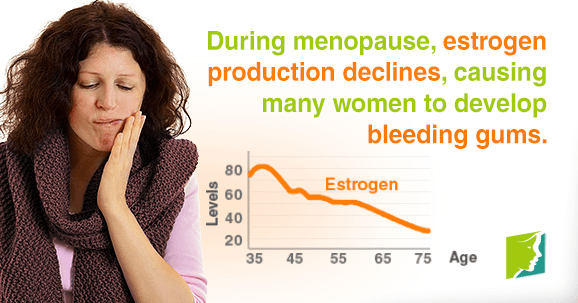Bleeding gums are a problem that can affect many women. It can become a particularly bothersome problem during times of hormonal imbalance, such as during menopause. Keep reading to discover five little-known facts about bleeding gums.
Bleeding Gums Are Never Normal
Many women think that bleeding gums when brushing their teeth or eating certain foods is a common, normal thing to happen. However, bleeding, swollen, red gums are never normal, and you should make an appointment to visit a dental professional if you notice any of these symptoms to ensure it is not a sign of an underlying condition.
Healthy Gums Can Become Diseased in 24 Hours
It only takes 24 hours for healthy gums to become infected if adequate oral hygiene levels are not observed. In order to prevent this happening, you should take care to brush and floss your teeth after every meal. Electric toothbrushes can be a help in preventing bleeding gums, as the automatic brushers massage the gums and encourage blood flow.
Diet Counts
What you put into your body through your diet can have a massive impact on the health of your gums and teeth. Processed food is never a good idea for oral health, but getting a balanced, steady intake of fruits, vegetables, calcium, magnesium, and vitamins C, D, and K can help keep gum disease and bleeding gums at bay.
Smoking Can Cause Bleeding Gums
Smoking is one of the most significant factors associated with gum disease. Not only does it increase your chances of developing bleeding gums, but it can also prevent gum treatments from working. Quitting smoking will not just improve your gum health, but also your overall wellness.
Imbalanced Hormone Levels Can Contribute
Bleeding gums are especially common at times when hormone levels are unbalanced, such as during menopause. Estrogen has a huge impact on the strength of jawbones, as well as the health of gums and teeth. It also affects the immune system, which fights against bacteria in the mouth. During menopause, estrogen production can become unsteady and ultimately decline, leading to bleeding gums in many women.
Bleeding gums are a common problem, but not one that should be treated as normal. Fortunately, there are things that can be done to stop the development of bleeding gums. Understanding that bleeding gums are a problem and making lifestyle changes with regards to diet and smoking can help considerably. Many women also complement these lifestyle changes with hormone-balancing or immune-boosting supplements.
Sources
- American Academy of Periodontology. (2012). Gum disease and Women. Retrieved September 17, 2013, from http://www.perio.org/consumer/women.htm
- Fotek, P. (2012). Bleeding gums: MedlinePlus Medical Encyclopedia. Retrieved September 17, 2013, from http://www.nlm.nih.gov/medlineplus/ency/article/003062.htm
- National Health Service UK. (2012). Gum Disease. Retrieved September 17, 2013, from http://www.nhs.uk/conditions/Gum-disease/Pages/Introduction.aspx


